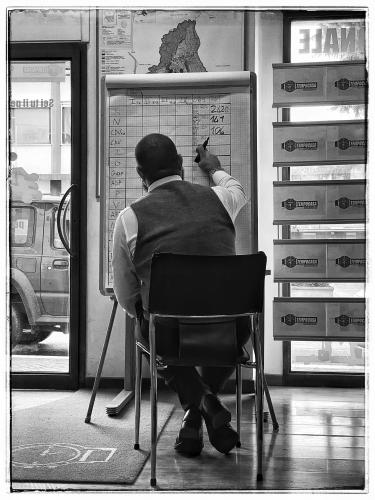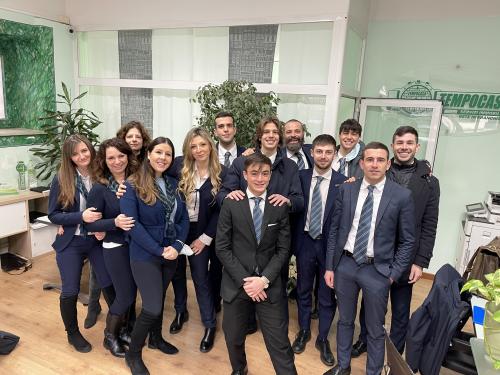Interview: 'Dynamic' Rome property market adapts to pandemic challenge, estate agent Ruggero Marconi says

ROME -- Ruggero Marconi is a respected, leading real estate agent with over 15 years of experience in possession of a deep knowledge of the local property market and through his affiliate agency Tempocasa offers a wide range of services to facilitate and assist clients throughout the process of selling, buying or rental of real estate.
Italian Insider: How has the Covid pandemic affected the property market in Rome and Lazio – has the uncertainty led sellers to reduce their asking prices for apartments and villas meaning there are now more bargains on the market or is the market merely stagnating?
Ruggero Marconi: In my opinion, the advent of the pandemic and the 45 days of the first lockdown have changed the whole real estate market in the Roman hinterland more than in the last 20 years. About 30 percent of the urban citizens live in buildings with no external space and had to face the lockdown in small apartments (on average 50-60 sqms.).
As a consequence, during the lockdown they have meditated the possibility of selling their property and move out of the city in wide country side areas adjacent to the metropolitan area. This sort of migration has led to a fast and dynamic market that is gradually adapting to the times, just as prices are stabilizing and aligning also on the basis of market assessments dictated by bank appraisals and various other comparative factors.
Currently, there is no intrinsic value per square meter, which is the reference baseline that one would normally look at when considering the purchase or sale of a property or making a comparative estimate.
What is now establishing the value of a property is the price of other similar property sold or purchased in a specific area. Nowadays, in order to be able to offer a correct evaluation of a property, an experience and a widespread presence in the area of competence is necessary, as the variability of prices is also dictated by the quality, by the architecture, by the logistics and above all by the peculiarities and characteristics of the property itself.
Furthermore, a feature not to be underestimated, which in the past has been much less taken into consideration, is the energy class or the A.P.E. (Energy Performance Certificate). In this time, knowing how much it costs to heat your home, has become a determining factor for the choice of a property. In conclusion, prices have fallen but are stabilizing, the market is in turmoil, my Agency RM Tempocasa Formello has gone from 40 to 14 appointments to arrive at a real proposal from a buyer.
Today the fear of being closed again and living through a lockdown lacking adequate spaces, even for a couple in smart working, is a determinant factor dictating the housing needs. Contrary to the past large indoor spaces have been replaced by green outdoor spaces and healthier air. These are the two main characteristics that prompt a faster choice in the selection of a new property.
II: Successive ‘Red Zone’ lockdowns have increased interest in buyers to acquire apartments with terraces or ground floor flats with gardens to make life more enjoyable when they are stuck at home. Have the prices of properties with open space increased, making them more attractive investments than before either for living in or for buy-to-rent?
RM: There is certainly a great demand for properties with external vents, as mentioned above, be it a garden, terrace or penthouse. To give a practical example -- in my area of competence, that is the areas north of Rome, the lockdown has triggered a great turnaround, in the sense that until three years ago, in the territory of Formello, selling a property over 400,000 Euros although worth and adequate to the market standards, was yet quite difficult while today there is a greater opening to the market. A recent article published by the Municipality of Formello confirms a substantial demographic increase. Over just 4 months following the lockdown, the population of Formello increased by 373 units compared to an annual average of about 150 units.
II: Which are the areas of Rome and Lazio that you would recommend to expatriates, international civil servants working for the FAO, WFP and other UN agencies, as best value for money at the moment? Which areas would you recommend for ease of access to the FAO, WFP and IFAD headquarters?
RM: This is a good question and could have multiple answers based on the individual needs of expatriates and international officials, for example: role, working hours. Undoubtedly, if one needs to reach the workplace by nine in the morning, it is preferable to consider areas relatively close to the workplace but it is also true that it is fairly easy to reach the city central areas either through public transport or consular roads. I.e. from North Rome the railway line Viterbo-Rome (Cesano-Olgiata-La Storta). That said, one of the most attractive areas is Olgiata, the first real Italian "gated community," that has become very popular over the years in particular within the international communities and expatriates. Its appeal is not limited to its superior territorial and housing facilities but above all to its proximity to the main international schools. Olgiata has consolidated as a best and preferred choice by foreign citizens who appreciate and value its splendid landscapes, the healthy air and the proximity to all the main city amenities and, last but not least, the advantage of living in an international environment at the border of the Eternal City.
II: Has the recent economic uncertainty impacted the mortgage market? In the past Italy lagged behind other European countries in the range of mortgages offered by banks and building societies. Is this still the case?
RM: The Consap Guarantee Fund has facilitated access to credit and throughout 2020 this has determined easier access to 100 percent value guarantee for mortgages for properties up to a value of € 250,000 for buyers not owning other properties in the Italian territory. This has permitted access to mortgages to young buyers, for example just married, enabling them to buy their first house and hence shifting from what would have been a rental solution to a purchase determining a significant rise in the number of sales and purchases of properties. This solution paired with the effect of ECB’s low interest rates (lowest in history) Italy has given a great and meaningful boost to the real estate market. Interest rates in the near past averaged between three (in the most fortunate cases) and four percent, today fixed rates remain stable at around 0.80 percent. It is not predictable how long this trend can last over time, but as long as this scenario remains, it will be beneficial to the revitalization of the real estate industry.
II: Under the recent regulations a block on evictions has been imposed by authorities until June. Do you think this will be lifted eventually and how has it impacted the buy-for-let market. Can your firm help to advise property owners on selecting and finding suitable, reliable tenants and arranging contracts?
RM: Surely the blocking of evictions has led to a halt by investors in buying income properties, except for secure income (large companies, institutions, supermarkets, etc.). We, as a real estate agency, offer the widest possible guarantees to landlords, but often a more accurate control of the possible tenant collides with current privacy regulations. It is certainly possible to provide multiple guarantees such as a bank guarantee, employment contracts, pay slips or alternatively an insurance coverage. RM Tempocasa Formello care the customers and their needs, offering advice on the best lease contract.
The lack of a clear yardstick, does not help a firm answer. All those properties that had a sort of receptive indication are now on standby, I believe that, to date, a good structure suitable for the reception of the elderly can be considered as a good investment.
II: Many expatriates and retirees are daunted by what they believe to be the prospect of dealing with Italian bureaucracy if they decide to buy a property in Italy rather than renting. Is this still a hurdle today and how can a leading estate agency like yours assist would-be buyers to overcome the red tape.
RM: Confronting with the Italian bureaucracy is generally dramatic but even more so for foreigners it could be traumatic. While we may have become accustomed to the cumbersome “Italic system” and equipped to struggle with bureaucracy, a foreigner absolutely needs support of a reliable guide. Reliance on local professionals rooted in the area and acquainted with the many and specific bureaucratic issues is essential. For example, access to the technical office of the Municipality of Formello, to check the progress of the works, can be granted in a maximum 10 days, the same in Rome could take from three to six months. The perfect mix to support a client in his/her first approach with the Italian market is undoubtedly a competent realtor with his/her real estate agency, a good notary and good technicians (Engineer, Architect, Surveyor) who master the area, the local urbanization and have access to the local authorities.
II: In addition to Coronavirus, Brexit has created uncertainty for British citizens who want to buy holiday homes or retirement residences in Italy in popular locations for foreigners such as Lakes Bracciano and Bolsena or in Umbria. Are there ways around the new regulations for UK expatriates, if they have registered in time as resident in Italy by the deadline of last Dec. 31, or even if they haven’t? What about Britons who own property in Italy and want to sell up to return to the UK – is this a good time or would it be better to wait for the market to settle down?
RM: If a foreigner, who owns a property in Italy, wants to sell now, my suggestion is to wait. Currently in Italy there is the best market of the last 20 years in terms of purchases, because there have never been such low prices and such low mortgages, the side effect of this scenario is that the seller's market is automatically penalized. Surely any kind of forecast, which prior to the pandemic could have a lap accuracy of 6 to 12 months, can now change rapidly and the possible forecast is only 1 to 2 months at the most.
II: What are the main pitfalls facing foreign buyers from your experience and what is the most important advice you have for them to avoid disappointment?
RM: As previously mentioned, today a foreigner who wants to buy real estate properties in Italy must avail of high-profile professionals. We have mentioned the importance of an experienced realtor, notary, architect or the like and a foreigner should rely on one or more of these professionals. The support of even one of these professionals could guarantee the foreign buyer provided that the skills and knowledge of the market are wide and specific to the area of interest. For example, a good notary can advise and prevent possible documentary and authorization pitfalls; a good technician (surveyor, engineer), familiar with real estate procedures, is aware of the governing laws and local urbanization plans, same for a professional real estate agent. The wisest advice is to conduct negotiations by binding the economic outlay to a documentary validation (Land Registry, Urban Planning, Sanatoria, Cila, Usability, Licenses, Building Permits).
II: What are the qualities that a top estate agent needs to develop? How long have you been running your own real estate firm?
RM: A real estate agent is an important link in the social fabric in the country of competence, whether he/she operates in the city (neighborhood), region or more widely nationally. I could rank the qualities although my strong belief is that all these qualities must be owned by the realtor either directly or through a solid and professional team of coworkers.
The primary quality of a valid realtor is listening, a catalytic ability to listen to the seller and the buyer merging both sides views and needs for the best optimal solution for both. The second quality of a top agent is the ability to quickly match supply and demand. The properties are not chosen exclusively for need, if a customer calls us looking for, i.e. a property with two bedrooms, kitchen, bathroom and garden, one could assume that identifying a property with these features, leads to the conclusion of the purchase, but this is not so.
The real estate agent who can truly advise his client is that person who understands the emotion that the client wants to experience by purchasing that property. Behind every need there is always an emotion.
The third quality of a top agent is humility, humility because the knowledge in this sector is so wide and variable that an agent MUST make use of excellent competent professionals with no presumption or conviction that he/she always has the handy solution. Working with strong professional ethics, this is the real secret of a Top Real Estate Agent.
I do my job not according to me but according to objective data, because the "according to me" is misleading and limiting. This principle has accompanied my professional growth from the first days that I undertook this career and this was a long time ago, more than 15 years!
II: What was the genesis of your making a career in the real estate business and what do you enjoy about it most?
RM: It is certainly an articulated answer. I am honest to admit that as a child, when I was reading signs “real estate agency” I thought that it was a furniture store. I started this profession at the age of 19, and up to that time I had never considered that having a home or finding a home were topics to worry about.
It was only when I faced the concern of finding a job and with this scope explored this world that I grasped the real sense and role of real estate agencies. I certainly tend to like and be good at trade, negotiation and bringing people together: in a nutshell all the elements that a good real estate agent represents.
Thanks to my attitude and ambition, the latter a sane and healthy aspect that supports growth in any field of a person’s life personal and professional, I had the opportunity to create my network, to open offices, to meet and select the right people and build a dynamic reality formed by a team of motivated and professional colleagues.
Beyond profitability, the joy in the eyes of a satisfied customer who sees a dream come true is the best reward. Human gratification is what pushes me every day to do something more and better for this job. Last but not least, the possibility of mentoring and forming staff and accompany them in their professional growth. Similarly, to what happened in my case, most often the age of boys and girls undertaking this career ranges between 19 and 20 years. This is when they start facing real life, each one with a specific identity, attitude and quality but all with the aim of forming their career for the future.
Believe me the most rewarding aspect of dealing with my staff is enabling and witnessing their progress. They enter my agency without a license, without a car, without economic independence and over a period of about two years they reach important milestones: a driving license and a car, a home where they can live independently, certification and registration in the Chamber of Commerce as certified real estate agents, they are building their future, this is my reward.




